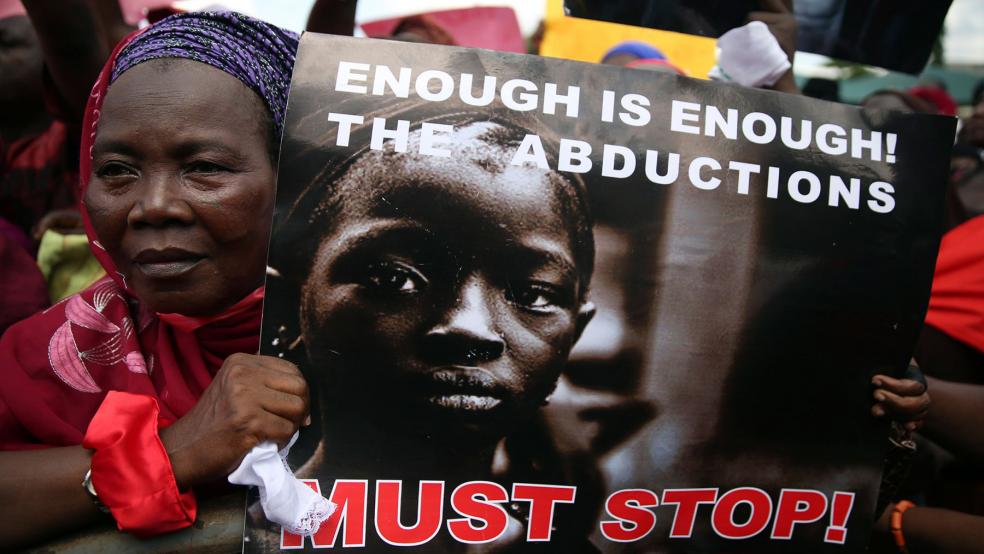Former Secretary of State and presumptive 2016 Democratic presidential contender Hillary Clinton has been under fire from Republicans in recent days for failing to designate Boko Haram, the group responsible for the kidnapping of some 200 Nigerian school girls, as terrorists after the group attacked a United Nations office in Abuja in 2011.
“It is so clearly and vividly a terrorist organization that it seems indefensible that the State Department would have refused to designate it as such,” Republican stalwart Newt Gingrich said, saying that this failure could be worse than her failure to act in Benghazi. “A thorough investigation of the decision process that protected Boko Haram from 2011 until late 2013 could be devastating.”
Related: Here’s What Could Get the U.S. Military in Nigeria
Others within the conservative media establishment like Rush Limbaugh and Elisabeth Hasselbeck have also been hammering Clinton for failing to formally call Boko Haram a Foreign Terrorist Organization (FTO). But even within the Obama administration, Clinton was urged to label the group as terrorist.
Diplomats in the State Department, the CIA and the FBI all urged Clinton to put Boko Haram on the official terrorist list. Lawmakers from both sides of the isle also urged Clinton to act on Boko Haram.
On May 24, 2012, then Senators Scott Brown (R-MA), Saxby Chambliss (R-GA) and James Risch (R-ID) introduced the “Boko Haram Terrorist Designation Act of 2012.” The act urged then Secretary of State Clinton to justify why Boko Haram would not be classified as such based on seven points they submitted, including the bombing of the UN facility where 21 people died; bombs attacking worshipers on Christmas day 2011 where 41 people were killed; Boko Haram’s 2010 support of al-Qaeda and threats to the U.S.; and current and former officials of the U.S. and Britain referring to Boko Haram as a terrorist organization.
“We are deeply concerned that Boko Haram’s tactics, targeting and fundraising operation appear to be increasingly international in scope, including within the U.S. homeland,” then-Homeland Security Committee Chairman Peter King (R) and Patrick Meehan (D), chairman of the Subcommittee on Counterterrorism and Intelligence, wrote in a March 2012 letter to Clinton.
Related: Why Boko Haram Might Be Impossible to Stop
Because she’s the Democratic frontrunner, the questions about whether Clinton should have labeled the group terrorists aren’t going away. But a close examination of the group at the time, and the reasons why she didn’t, show that the decision she made was the right one. Here are three reasons why:
1. The Nigerians didn’t want it. According to Robert Jackson, the principal deputy assistant secretary for African affairs, Nigerian President Goodluck Jonathan didn’t want the group to be labeled as a FTO.
“The government of Nigeria feared that designating these individuals and the organizations would bring them more attention, more publicity and be counter productive," Jackson told a Senate subcommittee earlier this month. "For some time we accepted that point of view.”
2. It would have been ineffective. The FTO designation allows the United States to prohibit American businesses from doing business with the group, as well as prohibits American citizens from funding it. Because the group has no economic ties to the Untied States, these tools would have been ineffective.
All the FTO would have done was raise the profile of the group. It’s not as if the United States was idle in the early fight against the group; it increased aid to Nigeria and sent FBI agents there to help.
Related: Libyan Mission Over, But U.S. Deeper into Africa
3. At the time, the group posed no threat outside of northern Nigeria, and there was little evidence that it had connections to al Qaeda. Boko Haram is not one of the four groups that al Qaeda leader Ayman al-Zawahiri has granted the al Qaeda tag. Al Qaeda has even condemned the group for the kidnappings.
Boko Haram has more similarities to a gang than an organized terror group like al Shabaab in Somalia and Kenya and al Qaeda in the Islamic Maghreb in North Africa. Its leader, Abubakar Shekau, is an Islamic radical, but most of the foot soldiers are young men with no futures fed up with endless cycles of poverty and government corruption.
4. Getting into the anti-terrorism business with the Nigerian military is a losing proposition. The Nigerian military is responsible for a host of their own human rights abuses in their effort to eradicate the group. Providing anything more than information that could help locate the girls would be supporting these violations.
As the group grew more powerful, and the threat it posed leaked into Nigeria’s neighbors, Clinton’s successor John Kerry designed the group an FTO in November 2013. Suggesting that Clinton’s failure to do so would contributed to the kidnappings is playing politics with a tragedy.
Top Reads from The Fiscal Times:
- U.S. Plays Catch-Up with China on Cyber Warfare
- Scramjet: DOD’s New Screaming Fast Hypersonic Weapon
- We’re One Step Closer to Robots on the Battlefield





